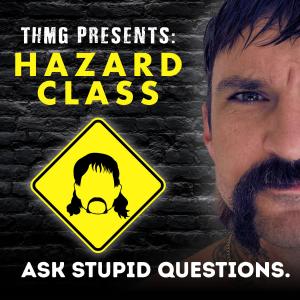HAZARD CLASS

HC0029 - The Gladiator Historian (Part 1) Featuring: Alexander Mariotti
0:00 – 1:44 | Introduction & Wheel of Stupid Questions
- Jake introduces the episode and Alexander Mariotti.
- Fun opener: “What’s the largest animal you think you could fight with your bare hands?”
- "In true gladiatorial fashion, a rhino at the moment." – Alexander Mariotti
1:45 – 3:34 | Why Gladiators?
- Alexander’s personal and familial connection to Roman history.
- His upbringing near the Colosseum inspired a lifelong passion.
3:35 – 6:26 | From Side Quest to Career
- Serendipitous journey into TV/film consulting and stunt work.
- How passion and historical expertise translated into a unique career path.
6:27 – 9:52 | Ancient Wisdom in Modern Life
- How Roman philosophy, especially Stoicism, shapes Mariotti’s worldview.
- "History is the teacher of life." – Alexander’s father
- Inspiration and resilience drawn from figures like Caesar and Spartacus.
9:53 – 14:37 | Gladiators: The Truth vs. The Myth
- Dispelling Hollywood misconceptions: Gladiators as athletes, not slaughter fodder.
- Gladiator games as structured, theatrical, and skillful performances.
- Comparison to modern MMA and WWE.
14:38 – 18:33 | Virtus: The Roman Philosophy of Manhood
- Mariotti explains "Virtus": physical and mental resilience.
- "The gladiator didn’t fight to die. He fought knowing death might come."
18:34 – 25:41 | A Day at the Colosseum: Immersive Storytelling
- Stunning reenactment of what attending a gladiator event felt like.
- "Trees would start to pop out of the ground, transforming the arena into a jungle."
25:42 – 30:12 | Economics and Power Behind the Games
- Games funded through sponsorship, not taxes.
- The emperor's role: political showmanship akin to NFL advertising.
30:13 – 34:47 | Executions & Public Spectacle
- Executions were about deterrence, not entertainment.
- Separation between criminal punishment and gladiator combat.
34:48 – 38:00 | Gladiators: Revered, Reviled, and Misunderstood
- Their celebrity status, contractual structure, and economic opportunity.
- "They were like reality stars: admired, desired, and judged."
38:01 – 44:08 | The Fall of the Gladiator Games
- Decline due to religion (Christianity), economy, and politics.
- "Religion, economy, and politics—those three always change the world."
44:09 – End | Communication & Spectacle in Ancient Rome
- Ingenious ways the Romans managed crowd communication without microphones.
- Discussion ends with enthusiasm for exploring Gladiator films (teased for a future episode).
- "History is the story of people whose lives never went the way they thought they would."
- "You are your champion gladiator — the same way you are your Super Bowl quarterback."
- "The only thing that changes are the actors. The play is the same." – Marcus Aurelius






 Visit Podcast Website
Visit Podcast Website RSS Podcast Feed
RSS Podcast Feed Subscribe
Subscribe
 Add to MyCast
Add to MyCast